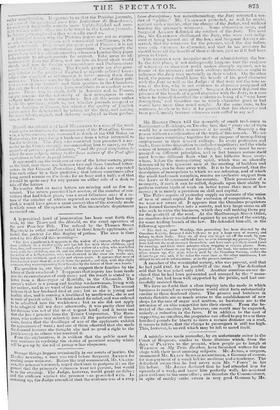A hypocritical howl of lamentation has been sent forth this
week, by the Tines and the Herald, on the cruel operation of the new Poor-law Bill. The refusal by the Thames Street Magistrate to order out-door relief to three female applicants, af- forded the pretext ftr this display of pathos. The case is thus stated by the Herald this morning- " The first (applicant), it appears, is the widow of a sawyer, who dropped down suddenly in a limber-_and, and has left her with three children, aged three, five, ana seven years! The second, the widow of a sailer, who was killed at sa, with two eldhlrcu, one :`ix and the other fottr years of age! The third, the widow of a Irt■last-getter. who was drowned in the river six weeks ago, leaving her two children, aged eight and eleven years. It appears that none of these received more than :Is. a week front the parish ; and that, with this slight assistance, they were rupporting their families by the labour of their own hands."
The question is, are they able to support their families by the labour of their own Land., ? It appears that inquiry has been made into the circumstances of each case; and the result i3 stated in a letter from a Rate-payer of Ratcliffe, in the Chronicle. The sauser's widow is a young and healthy washerwoman, living with her mother, and in no want of the necessaries of life. The second believes that her husband died at sea; but as she is young and healthy also, and is earning a livelihood by needlework, she is not in want of parish relief. The third asked for relief, and was ordered to be admitted into the workhouse ; but as she did not apply to be adnzitted till ten days afterwards, it was pretty clear that her distress was not of the most urgent kind; and it turns out that she has a pension from the Trinity Corporation. The Rate- payer, who enters very minutely into all the particulars of these cases, denies that the dwellings of any of the applicants exhibit the appearance of want ; and one of them admitted that she made thedvatand because she thought site had as good a right to the latish non.ey as others who received it. From the explanation, it is evident that the public must be very cautious in crediting time stories of parochial cruelty which will be gut up by the aid of penny-a-line eloquence.




















 Previous page
Previous page